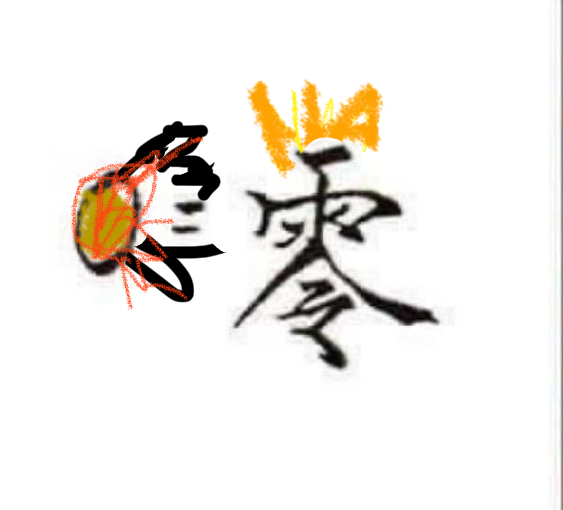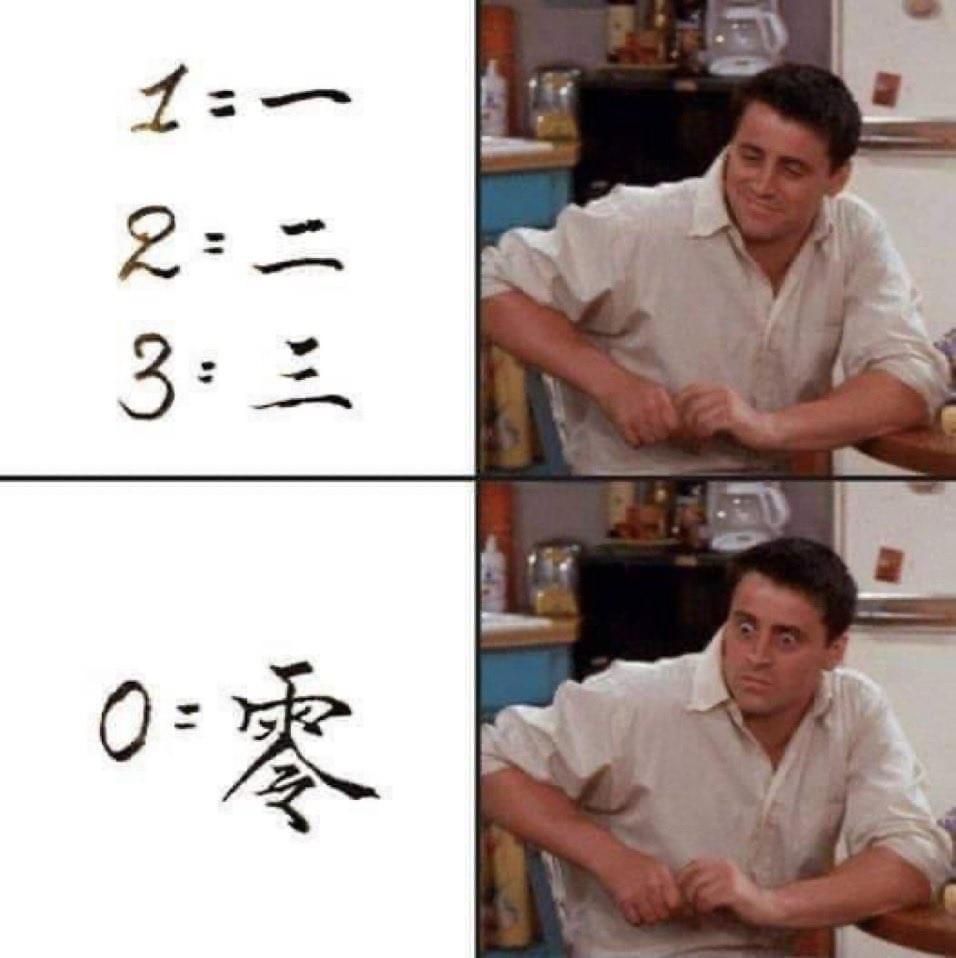It's to scare people off from dividing by it.
Memes
Rules:
- Be civil and nice.
- Try not to excessively repost, as a rule of thumb, wait at least 2 months to do it if you have to.
They have to sell zero to a US owned company.
I'm sure the chinese have equivalent memes about having to learn arabic numbers, at least you don't have to use it in written out numbers, 20 is 二十, two-ten, 200 is 二百, two-hundred, 2000 is 二千, two-thousand, 200,000 is 二十万, two-hundred-thousand.
There less memorizing irregular words like twelve and X-teen and converting 30 to thirty, since it's all pronounced as written.
It probably sounds silly but I quite enjoy not memorizing different names for days of the weeks and months like when I was learning french ... Lundi, Mardi ...
Nice to be like 星期一,星期二,星期三 ... for week days and 一月,二月,三月... for months.
Same, and not having to remember different versions of words for tense and gender is great. Where Chinese gets you back though, is measure words. Is a can of beans many 颗? 粒? One 包? Oh I was supposed to remember 罐?
I mean tbf you're addressing a can of bean, so 罐 is correct. It's the container that count, not the content.
I don't mind the measure words so much because you can always use the generic one and people will understand, it's the tones that really mess me up.
The separate counter for 10,000 does my head in
I lived in Korea for a while where they also do the ten thousand thing. I got used to it for numbers up to about ten million, but then would get quickly lost.
Since everybody was making a couple million won a month, knowing numbers that big was necessary.
Shhhh they don't need to know that yet.
Japanese pronounces some numbers different depending on what you are counting. Is this the same for Chinese?
I think there are certain phrases found in different dialects of Chinese. In Cantonese, the formal way of reading twenty is 十二, but the colloquial term would be 廿.
Edit: Should be 二十
No, but whenever you have something that's countable (even if it's just 1), you have to do , so instead of "I have a ticket" or "we want 2 waters", you have to do "I have 1 ticket" or "I(plural) want 2 water".
There's a generic measure word, but I think it's seen as improper to use it.
Yea, Chinese people understand when you do that, but they first look at you with this confused look thinking 'he wants two chopstic pieces?' and then realize you have a vocabulary of a two-year-old.
Source:lived in China long enough to learn yo ask for things, but not long enough to learn the countable nouns.
A bit like confusing much and many or some and any, which I did a lot when I first learnt English.
I would have interpreted that as 'prolapse'
Good thing no one is expecting me to provide translations
It's clearly a man pissing his name into the snow (in simplified Chinese)
Good energy, it just didn't work here. It would if you had the word bussy: 菊
ITT, a bunch of people who know literally nothing about this subject offering explanations.
The character 零 ("líng") contains a semantic component (on the top) and a sound component (on the bottom), the semantic component is 雨, meaning rain, and the sound component is 令 "lìng".
The word initially referred to very light rain and so the character essentially means "the type of rain that sounds like lìng". For whatever reason the meaning drifted from very light rain towards "barely any" and then "nothing/zero".
The bottom/top usage is simple, the "zero" is the receiving hole and the "one" is the penetrating appendage, i.e. the submissive versus the dominant partner. That usage is definitely slang, though!
So basically the word for zero is "drizzle"?
That's awesome
Ultimately that's the origin of the character. Although it's quite common to see "〇" in written shorthand when 零 is being used as a middle or final zero in a number otherwise written in characters, like 906 could be written as 九零六 or 九〇六.
Thank you for giving the correct explanation. Pretty sure all those other "explanations" are just jokes though.
Yeah, why didn't they just go with 0 lines?
Edit: /s
It's basically what Arabic numerals did.
"I circled the zero lines here."
I dont know Chinese but it probable means empty or something.
According to wiktionary, it means to wither and fall, in some contexts it's used to refer to rain or tears.
It also means bottom(in gay contexts). lmao what that zerussy do?
一 (one) also means top (in gay contexts). It's because 0 looks like a hole and 1 looks like a penis.
It meant "falling from the heavans"/ "rain"

wdym complicated? it's easy!
壹貳參肆伍陸柒捌玖拾 see? easy!
For everyone who don't know, this is the complicated version of Chinese numbers. In modern days, they are mostly used in writing cheques, because these characters are not as easily modified as the simple version.
When I went to China about 5 years ago, all the numbers were Arabic numbers. Not sure if this is a regional thing, or if this is a more recent development.
The Chinese numbers are already in use ages ago and (as far as I know) predates the Ming dynasty. Fun fact, there are both “upper case” Chinese numbers (壹,貳,叁,⋯) and “lower case” numbers (一,二,三,⋯). The uppercase numbers are still used in official documents, esp. monetary ones such as checks to indicate the monetary value. For example: “壹拾贰万叁仟肆佰伍拾陆元整” means “¥123,456”. According to Wikipedia, this is done to prevent the numbers from being doctored, like changing 1 to 7.
It’s true that the lower case numbers aren’t used as much, but they are still used in text when the number is less than ten, e.g. “I have three children” -> “我有三个孩子” as opposed to “我有 3 个孩子”, for better paragraph consistency, typesetting and whatnot. However the Chinese numbers will become too long for anything greater than a hundred, so it’s all Arabic numbers after that.
Source: am Chinese
That's super interesting! I barely know any Chinese and probably just assumed the characters were for language instead of numbers.
The public transit system used arabic numbers (maybe as well as the Chinese characters?), so at least that was easy to navigate lol
Wow! Uppercase numbers. Fascinating.
Using Chinese characters instead of Arabic numerals is the equivalent of spelling out numbers in English.
Probably because zero is technically a concept not a number. Roman numerals didn't even have a zero


